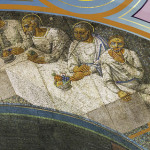We run our website the way we wished the whole internet worked: we provide high quality original content with no ads. We are funded solely by your direct support. Please consider supporting this project.
What is the significance of Jeremiah 42:9-16?
Through Jeremiah the Lord tells Israel “If you stay in this land, I will build you up and not tear you down; I will plant you and not uproot you, for I have relented concerning the disaster I have inflicted on you” (vs. 10). Then, a few verses later, he says, “However, if you say, ‘We will not stay in this land,’ and so disobey the LORD your God, and if you say, ‘No, we will go and live in Egypt, where we will not see war or hear the trumpet or be hungry for bread,’ then hear the word of the LORD, you remnant of Judah. This is what the LORD Almighty, the God of Israel, says: ‘If you are determined to go to Egypt and you do go to settle there, then the sword you fear will overtake you there, and the famine you dread will follow you into Egypt, and there you will die” (vss. 13-16).
Note that the Lord speaks in “if” terms. The Lord ordains what the consequences of the Israelites choices will be, but not the choices themselves. These remain genuinely open. Note also that this entire episode is predicated on the fact the Lord had changed his mind (“relented”) about a disaster he planned on bringing on his people (vs. 10).
Category: Q&A
Tags: Open Theism, Q&A
Topics: Open Theism
Verse: Jeremiah 42
Related Reading

Podcast: If the Future is Open How Can We Know God Wins in the End?
Greg discusses the open future and speculates on how God can still be assured victory in the end. http://traffic.libsyn.com/askgregboyd/Episode_0069.mp3

What is your perspective on the classical view that God is above time?
In a major strand of hellenistic (Greek) philosophy, change was seen as being an imperfection. This idea was adopted by many early Church fathers and eventually became almost an assumed dogma of the Church. It was thus assumed that, since God is perfect, he must be above all change. Not only does his character and…

Is exhaustively settled foreknowledge essential to God’s identity
In this episode Greg discusses several passages in Isaiah that imply God’s foreknowledge is a primary differentiator between Isaiah’s God and all other gods. Links: Greg’s book: “God of the Possible“ http://traffic.libsyn.com/askgregboyd/Episode_0023.mp3

The Logical Hexagon Made Simple
by: Greg Boyd The Hexagaon in a Nutshell For those of you who don’t have the twenty to thirty minutes it will probably take to read this essay but who nevertheless would like to have some idea of what the Logical Hexagon is all about, here is my two sentence elevator speech: The Logical Hexagon…

What is the significance of Numbers 14:12–20?
In response to Israel’s bickering the Lord says “I will strike them with pestilence and disinherit them, and I will make of you [Moses] a nation greater and mightier than they” (vs. 12). Moses asks the Lord to forgive the people, and the Lord eventually responds, “I do forgive, just as you have asked” (vs.…

The Open View of Messianic Prophesies
Image by Lawrence OP via Flickr A number of passages speak of particular events being foreknown by God, even events resulting from individuals’ free will. For example, dozens of prophesies in the OT accurately predict details about the coming Messiah (e.g., he would be born in Bethlehem; arise out of the lineage of Abraham; be executed with…
